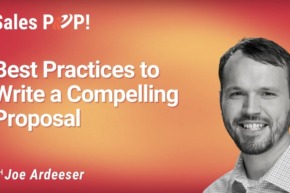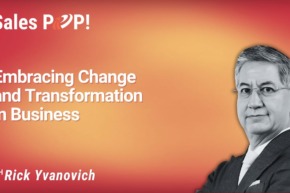“Bend the fish while it’s fresh.” This quirky metaphor is used by Torben Wiese to highlight the importance of mindfulness. Watch this sales expert interview, hosted by John Golden, to hear how this metaphor applies to sales.
In this sales expert interview, get professional sales tips on:
- How to be mentally present as a salesperson
- How to keep your clients mentally present
- Changing habits to improve sales
- Reacting to rejections
Being Mentally Present
“We have the past and the future, but to be a good salesperson, you have to be 100% mentally present,” said Wiese. Not only do salespeople have to be in the present moment, but customers need to have present minded thinking as well. Customers, like most people, are thinking about the next moment. Like their email inbox, and how long is it polite to keep the salesperson on the line before hanging up. However, a good salesperson will keep their prospects in the present moment to get their full attention and most efficiently sell to them.
Strategies to Keep Customers Present
Eye contact, exciting words, vocal intonation, and other nonverbal techniques are necessary to keep your pitch interesting. Additionally, identifying the customer’s needs and bringing them up proactively will keep them focused on what you have to say. “Explore future problems they want to solve or bring up problems they want to avoid,” said Wiese. “You need them to be mentally present to think about the future.”
Habits
A crucial part of creating change is to understand the habits that you do automatically. There are three kinds of habits. The first is physical habits, which include nonverbal communication such as voice, physical mannerisms, etc. The second kind of habit is mental habits, which look at positive vs. negative thinking tendencies, if thoughts are constructive or not, etc. The third kind of habit, emotional habits, are tendencies to feel certain things in certain situations. When thinking about habits, the trend is to think about physical habits. Because of this tendency, it’s often only the physical habits that get changed. However, to make real changes in our habits, salespeople must look at all three different kinds. “All habits feel good. A good habit helps us to reach our goals. A bad habit deters us from reaching goals,” Wiese said.
Reacting to an Objection
What do you say when you get an objection? Wiese gives the example of when a potential customer brings up the price. “Some people will say ‘it’s expensive!’. You don’t think about it; it’s just an automatic response. It feels like an attack that you have to defend yourself from.” This kind of mental habit can push clients away and demonstrate a defensive attitude. To personally address this problem, Wiese has a list of the 12 most common objections and has a prepared script to counter these objections in a sensitive way. “It shows that you’re not afraid of these objections, and you can be prepared for them when they come.”
Difficulty Done Right
We shouldn’t be looking to feel comfortable; we should be looking to really engage. It feels safe, but it might not be. Outside the comfort zone, create new habits that are outside the comfort zone. The most difficult habit to change is the one that you don’t know about. It’s important to watch yourself, get feedback, and continue to assess yourself. Salespeople need to do a better job taking accountability for themselves and being proactive in making concrete changes.
About our Host:
John is the Amazon bestselling author of Winning the Battle for Sales: Lessons on Closing Every Deal from the World’s Greatest Military Victories and Social Upheaval: How to Win at Social Selling. A globally acknowledged Sales & Marketing thought leader, speaker, and strategist. He is CSMO at Pipeliner CRM. In his spare time, John is an avid Martial Artist.







Comments